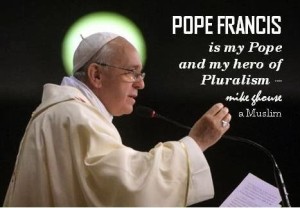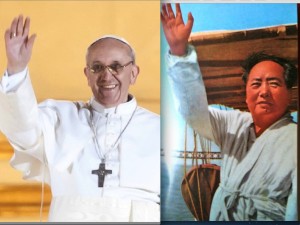Bergoglio Draws a Jesuit’s Fire for Whitewashing the Koran
By Rev. Anthony Cekada
BEFORE VATICAN II, the absolute last thing you’d expect to find a Jesuit doing was publicly attacking a papal pronouncement. The Jesuits, whatever their other considerable shortcomings, were regarded as fiercely loyal defenders of the papacy, the “shock troops of the Holy See,” who even took a special fourth vow to go wherever the pope would send them.
But as the trite 70s saying goes, “That was then and this is now” — the “now” being fifty years into the Vatican II demolition job on the Church, and nine months into the madcap reign of “Pope Francis,” a.k.a. Jorge Bergoglio.
In the months since his election, Bergoglio has produced torrent of pronouncements that have been alternately heretical, blasphemous, theologically ignorant, offensive, wrong-headed, goofy, clichéd, shallow, contradictory, or crypto-Marxist. Just as we predicted, this man is a loose cannon. He is a constant source of worry and appalling embarrassment to those people in the Novus Ordo establishment, now a minority, who still hold on to vestiges of the old religion. Many of these souls, however, have begun to criticize Bergoglio, openly and in mainstream media outlets.
The latest to take Bergoglio to task is an Egyptian Jesuit and expert on Islam, Rev. Samir Kahil Samir, who teaches in Beirut, Rome and Paris, and is the author of several books and essays on Islam and on its relationship with Christianity and the West. On December 19 the “Asia News” site of the Pontifical Institute for Foreign Missions published an extensive commentary by Fr. Samir on the passages dealing with Islam in Bergoglio’s September 24 Apostolic Exhortation Evangelii Gaudium. Thereafter, his article received a much wider publication when the respected Vatican correspondent Sandro Magister posted a large section of it in his blog on December 30.
While the first part of Fr. Samir’s commentary praises what he regards as “many positive things” in the exhortation, his second part, “Points of ‘Evangelii Gaudium’ that Require Clarification,” is of great interest to us — for it demonstrates that Bergoglio’s optimistic-sounding declarations about Islam are either the product of stupidity or are simply a pack of lies.
Here is synthesis of Fr. Samir’s catalogue of Bergoglian howlers on the subject of Islam, Moslems and the Koran, taken from Nos. 250-253 of Evangelii Gaudium.
1. Muslims “together with us adore the One, merciful God” (No. 252)
Sure, any traditional Catholic knows this is utterly false, just the sort of ecumenical garbage that the Conciliar Church has been putting out for decades. But what is significant is that Fr. Samir recognizes that Begoglio’s declaration is false, because “it suggests that the two conceptions of God are equal” — and does not hesitate to say so.
2. “Jesus and Mary receive profound veneration” in Islam (No. 252)
While Muslim women may indeed venerate the Blessed Virgin, says Fr. Samir, Our Lord “is not an object of veneration.” In fact, “all that is said of Jesus in the Koran is the exact opposite of Christian teaching. He is not the Son of God, but a prophet, and that’s it.”
3. “The sacred writings of Islam have retained some Christian teachings” (No. 252)
Fr. Samir says Mohammedans retain “words or facts” from the four Gospels and “pious tales” from the apocryphal gospels, but “do not draw from them the theological sense they contain, and so do not give these facts or words the meaning that they actually have…”
Moreover, Fr. Samir points out, the Koran is opposed to all the fundamental Christian dogmas:
- It explicitly condemns the notion that Christ is the Second Person of the Trinity.
- It condemns the doctrine of the Trinity.
- It denies the divinity of Christ.
- It denies the Redemption, claiming that Jesus Christ did not die on the Cross.
In short, Fr. Samir says, the Koran and Muslims deny the essential dogmas of Christianity. “One cannot then say that ‘the sacred writings of Islam regain part of Christian teachings.’” The Jesus of the Koran “has nothing to do with the Jesus of the Gospels.”
4. Muslims “acknowledge the need to respond to God with an ethical commitment” (No. 252)
Bergoglio tries to draw a parallel between Christians and Muslims on this point, and Fr. Samir demonstrates that this, too, is false.
- While for Christians, all men in need are supposed to be objects of their charity, among Muslims fellow Muslims are aided as a means of promoting “solidarity within the Islamic community,” as can be seen from the response of rich Arab countries to natural disasters.
- While for Christians, the discomfort of fasting aims to bring us closer to Christ’s own sacrifice, the farcical Ramadan “fast” allows you to eat as much as you want of the best food you want from dusk to dawn, as long as you eat nothing during the day. Ramadan is a time to stuff yourself with delicacies all night.
- While the Christian is supposed to forgive, as long as a Moslem observes Islamic law, everything is in order, and there is no obligation in the Koran to forgive.
- While Christian marriage raised the dignity of the woman through its indissolubility and through the obligations it imposed upon the husband, the Koran permits polygamy, allowing up to four wives; and as if this were not degrading enough, it even allows the husband to divorce and replace these, as long as the number remains at four.
5. “Obstacles and difficulties” from “fundamentalism on both sides” (No. 250, 253)
Of this particularly ripe bit of idiocy, Fr. Samir observed:
“Christian fundamentalists do not carry weapons… [But among Muslims,] armed fundamentalism seeks to replicate the Mohammedan example. In his life, Mohammed waged more that sixty wars, and if Mohammed is the supreme exemplar (as the Koran claims in 33:21), it is now not surprising that some Muslims also employ violence in imitation of the founder of Islam.”
6. “True Islam and the proper interpretation of the Koran oppose all violence.” (No. 253)
Fr. Samir really has to bite his tongue on this one to keep from calling Bergoglio either an idiot or a liar. Of the notion that “true Islam” opposes all violence, Fr. Samir says, “this does not seem to true,” and “needs a lot of explaining. It is enough to cite Chapter 2 and 9 of the Koran.”
“Here in the East,” Fr. Samir adds, “we understand very well that Islamic terrorism is religiously motivated.” Moreover, the question of giving a proper interpretation to the Koran, says Fr. Samir, is “the most heated — indeed, the most forbidden — debate in the Muslim world.”
* * * * *
THE VERDICT on Bergoglio’s treatment of Islam in Evangelii Gaudium, then, is obvious: Just about everything he says is false. It is a fatal combination of theological stupidity, ignorance of even basic facts about Islam, ecumenical wishful thinking and stale ’60s obsessions, spiced with a dash of anti-traditionalist rhetoric (“fundamentalists on both sides” — that’s you and me, folks). And the proof for these conclusions comes not from some dreaded sedevacantist (like me), but from a thoroughly “mainstream” Novus Ordo source, Fr. Samir, a former adviser to the Vatican on Islamic affairs and, like Bergoglio, a Jesuit to boot.
Bergoglio’s doctrinal errors and idiocies in Evangelii Gaudium are not limited to his four paragraphs on Islam. One could devote several weeks’ worth of blogs to dissecting the rest of the document and still not run out of material. It is loaded with errors and — there’s no other way to put it — idiocies.
Then there is the bigger picture: We have repeatedly stated (in a radio show the day after his election and in posts here and here on this site) that one of Bergoglio’s principal aims since he first stepped out onto the balcony at St. Peter’s after his election has been to diminish the papacy. He has relentlessly pursued this goal over the last nine months in his words and his intentionally hammy and well-publicized deeds. While Bergoglio is a typical ’60s Stalinist liberal who does not hesitate to use his authority to crush traditionalist opposition (“self-absorbed Promethean neo-Pelagians”), he realizes that one can also manipulate opponents as pawns in a scheme to achieve the larger revolutionary goal. This was the strategy Mao followed in his “Revolution of a Hundred Flowers” in order to draw out and then eliminate opposition. So, Bergoglio has even said publicly that he appreciates it when people correct him (it “manifest[s] love”) thus getting himself yet another twofer: publicizing his self-aggrandizing “humility” and diminishing deference and respect for the papal office. And he appreciates public correction? Tell it to Cardinal Burke.
All this, though, has a silver lining for those Catholics who have rejected the Vatican II revolution. Unlike the relatively staid and conservative front John Paul II and Benedict XVI tried to put on Vatican II, Bergoglio has pulled off the mask to reveal its true face: a revolution — in its original sense of an “overturning” — in Catholic faith, discipline, liturgy and morals. It is far easier for us to demonstrate that Vatican II caused a mess with Bergoglio running amok virtually every day. The contrast and opposition between the Catholic religion and the modernist religion of Vatican II will thus come into increasingly sharper focus for those souls in the Novus Ordo institution who still retain a traditional understanding of Catholic doctrine and morality.
So, if in the long run more Catholics eventually come to understand that Vatican II is the real problem and needs to be dumped, it will be due in large measure to the madcap antics of its Number One Fanboy — Jorge Maria Bergoglio, “Chaos Frank,” “Papa Gaga.”

